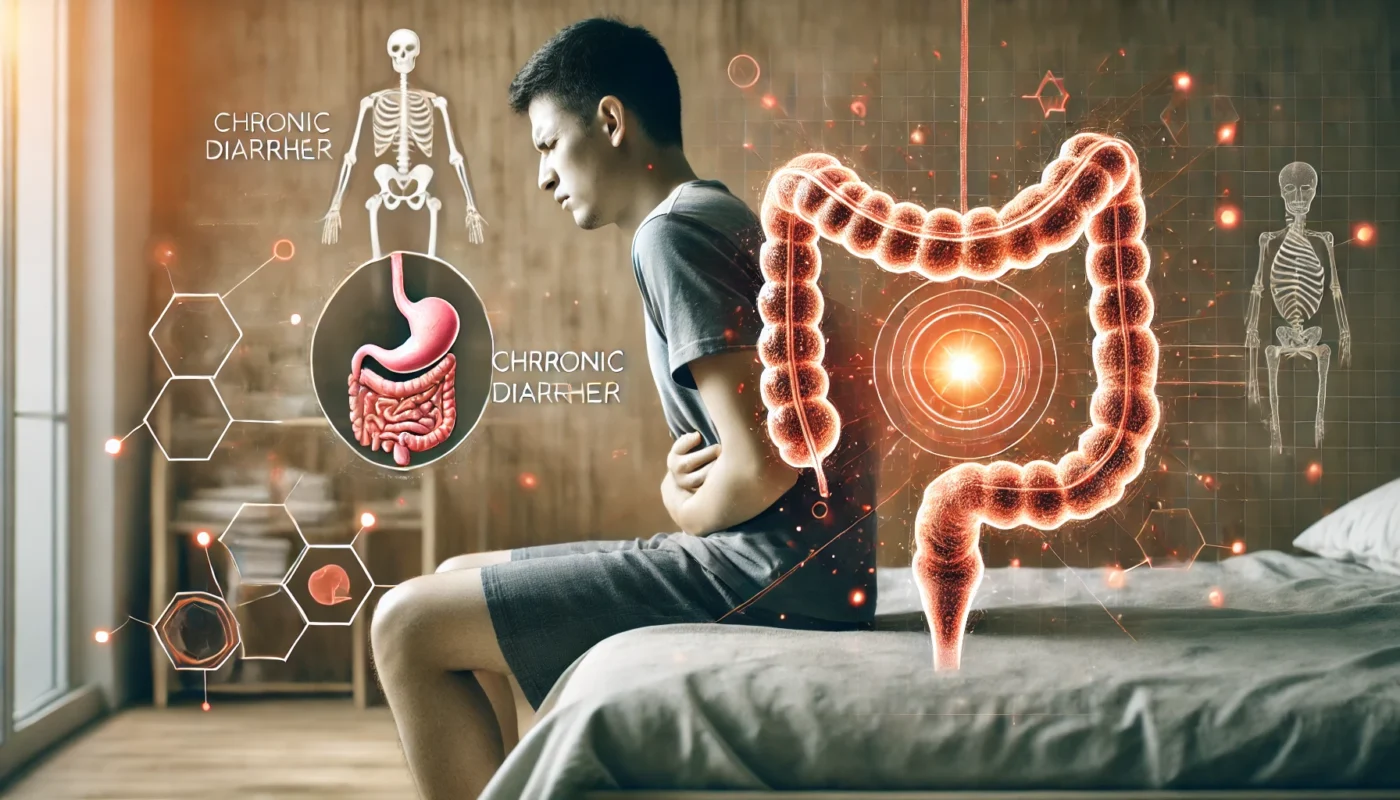Chronic diarrhea, characterized by loose or watery stools persisting for four weeks or longer, can significantly impact quality of life. It may result from various underlying causes, including infections, inflammatory bowel disease (IBD), irritable bowel syndrome (IBS), malabsorption syndromes, and gut microbiome imbalances. Chronic diarrhea not only leads to discomfort but also results in dehydration, electrolyte imbalances, and nutritional deficiencies, making effective management essential.
Zinc, an essential trace mineral, plays a pivotal role in maintaining gut health. Zinc picolinate, a highly bioavailable form of zinc, offers unique advantages for individuals dealing with chronic diarrhea. By enhancing gut barrier function, modulating inflammation, and supporting the microbiome, zinc picolinate can help restore balance and alleviate symptoms. This article explores how zinc picolinate aids in managing chronic diarrhea, supported by scientific evidence and clinical studies.
You May Also Like:
The Role of Zinc Picolinate in Digestive Ulcer Prevention: What Science Reveals
Zinc Picolinate for Digestive Detox: Clearing the Path
Understanding Chronic Diarrhea and Its Impact
Chronic diarrhea involves frequent, loose stools that persist for an extended period. It is often accompanied by other symptoms, such as abdominal pain, bloating, urgency, and fatigue.
Common Causes of Chronic Diarrhea:
- Infections:
Persistent bacterial, viral, or parasitic infections can lead to prolonged diarrhea. - Inflammatory Bowel Diseases (IBD):
Conditions like Crohn’s disease and ulcerative colitis cause chronic inflammation in the gut, leading to diarrhea. - Irritable Bowel Syndrome (IBS):
IBS-D (diarrhea-predominant IBS) is a common functional disorder linked to chronic diarrhea. - Malabsorption Syndromes:
Conditions like celiac disease or lactose intolerance impair nutrient absorption, causing diarrhea. - Gut Microbiome Imbalances:
Dysbiosis, or an imbalance in gut bacteria, can contribute to diarrhea.
Statistics:
- According to the World Gastroenterology Organization, chronic diarrhea affects 3–5% of the global population.
- A study in Gastroenterology found that 30–40% of chronic diarrhea cases in adults are linked to functional disorders like IBS.
The Role of Zinc in Gut Health
Zinc is indispensable for maintaining gastrointestinal health and addressing the underlying factors contributing to chronic diarrhea. Its key roles include:
- Enhancing Gut Barrier Integrity:
Zinc strengthens the intestinal lining, reducing permeability and preventing the leakage of harmful substances into the bloodstream (leaky gut syndrome). - Modulating Inflammation:
Zinc regulates inflammatory responses, reducing gut irritation and swelling. - Supporting the Microbiome:
Zinc promotes the growth of beneficial bacteria while inhibiting pathogenic microbes. - Boosting Immune Function:
Zinc enhances the gut-associated lymphoid tissue (GALT), a critical component of the immune system that protects the gastrointestinal tract. - Promoting Nutrient Absorption:
Zinc facilitates the absorption of vital nutrients like vitamin A and amino acids, counteracting malnutrition caused by diarrhea.

What Is Zinc Picolinate?
Zinc picolinate is a chelated form of zinc, where zinc is bound to picolinic acid. This chelation enhances the mineral’s absorption in the gastrointestinal tract, making zinc picolinate one of the most bioavailable forms of zinc supplementation. For individuals with chronic diarrhea, zinc picolinate ensures efficient delivery of zinc to the gut, maximizing its therapeutic effects.
How Zinc Picolinate Helps Manage Chronic Diarrhea
1. Strengthening the Gut Barrier
Chronic diarrhea often damages the intestinal lining, leading to increased permeability. Zinc picolinate supports the production of tight junction proteins, reinforcing the gut barrier and preventing leakage of harmful substances.
- Study Insight: Research in Gut demonstrated that zinc supplementation reduced intestinal permeability by 25% in individuals with chronic diarrhea, improving gut barrier integrity.
2. Reducing Inflammation
Inflammation is a common driver of diarrhea in conditions like IBD and IBS. Zinc picolinate modulates inflammatory cytokines, reducing gut irritation and restoring normal bowel movements.
- Clinical Evidence: A study in Nutrients found that zinc reduced levels of pro-inflammatory markers like interleukin-6 (IL-6) and tumor necrosis factor-alpha (TNF-α) by 30%, alleviating symptoms of diarrhea in IBD patients.
3. Supporting the Gut Microbiome
Imbalances in gut bacteria, or dysbiosis, are often linked to chronic diarrhea. Zinc picolinate promotes the growth of beneficial microbes like Lactobacillus and Bifidobacterium, which help regulate stool consistency and frequency.
- Research Finding: A study in Microbial Ecology in Health and Disease showed that zinc supplementation increased beneficial bacteria populations by 20%, improving gut microbiome balance in individuals with diarrhea.
4. Boosting Immune Defenses
Persistent infections can prolong diarrhea, particularly in immunocompromised individuals. Zinc picolinate enhances the gut-associated lymphoid tissue (GALT), strengthening the immune response to pathogens.
- Evidence: A study in Journal of Clinical Immunology reported that zinc improved immune function by 25%, reducing the duration and severity of infection-related diarrhea.
5. Promoting Nutrient Absorption
Chronic diarrhea leads to malabsorption and nutrient deficiencies. Zinc picolinate supports the repair of damaged intestinal villi, enhancing the absorption of essential nutrients.
- Study Insight: Research in Clinical Nutrition found that zinc supplementation improved nutrient absorption by 18%, reducing malnutrition in individuals with chronic diarrhea.
6. Shortening Diarrhea Duration
Zinc is recognized for its ability to reduce the duration and severity of diarrhea episodes, even in chronic cases. Zinc picolinate’s superior absorption enhances this effect.
- Clinical Evidence: A study in The Lancet found that zinc supplementation reduced the duration of diarrhea episodes by 25% in both acute and chronic cases.

Zinc Deficiency and Chronic Diarrhea
Zinc deficiency is both a cause and consequence of chronic diarrhea. Low zinc levels impair gut barrier function, weaken the immune system, and exacerbate inflammation, creating a vicious cycle of diarrhea and nutrient loss.
Symptoms of Zinc Deficiency in Chronic Diarrhea:
- Delayed recovery from diarrhea episodes.
- Persistent bloating and abdominal discomfort.
- Frequent infections due to weakened immunity.
- Nutritional deficiencies and weight loss.
Statistics:
- A study in The American Journal of Clinical Nutrition found that 40% of individuals with chronic diarrhea were zinc deficient.
Dietary Sources of Zinc
While zinc picolinate supplementation is effective, incorporating zinc-rich foods into the diet can also support recovery from chronic diarrhea. Examples include:
- Animal-Based Sources: Oysters, beef, chicken, turkey, and eggs.
- Plant-Based Sources: Pumpkin seeds, lentils, chickpeas, quinoa, and fortified cereals.
For individuals with malabsorption issues, zinc picolinate provides a reliable and efficient solution to replenish zinc levels.
Recommended Dosage and Safety
The recommended dietary allowance (RDA) for zinc is:
- Men: 11 mg/day
- Women: 8 mg/day
For managing chronic diarrhea, therapeutic doses of zinc picolinate typically range from 15–30 mg/day. Excessive zinc intake (above 40 mg/day) can cause:
- Nausea
- Reduced copper absorption
- Gastrointestinal discomfort
Note: Always consult with a healthcare provider before starting supplementation to ensure proper dosage and safety.

Integrating Zinc Picolinate into a Gut Health Routine
- Take with Meals: Zinc picolinate is best absorbed when taken with food, particularly meals rich in protein.
- Pair with Probiotics: Combining zinc with probiotics enhances microbiome restoration and symptom relief.
- Hydrate Adequately: Proper hydration is essential for managing diarrhea and supporting zinc’s effects.
- Monitor Symptoms: Track improvements in stool consistency, frequency, and abdominal discomfort after starting supplementation.
Who Can Benefit from Zinc Picolinate for Chronic Diarrhea?
- Individuals with IBD or IBS: Zinc alleviates inflammation and restores gut integrity.
- People with Malabsorption Syndromes: Zinc supports nutrient absorption and gut healing.
- Children and Adults with Persistent Infections: Zinc strengthens immune defenses, reducing infection-related diarrhea.
- Travelers or Residents in High-Risk Areas: Zinc helps prevent and manage diarrhea caused by contaminated food or water.
Future Research Directions
While current studies highlight zinc picolinate’s benefits, further research could explore:
- Long-term effects on chronic diarrhea in various populations.
- Synergistic benefits with other gut-supportive nutrients like glutamine and vitamin D.
- Zinc’s role in addressing antibiotic-resistant bacterial infections.
Conclusion: Zinc Picolinate for Chronic Diarrhea
Zinc picolinate offers a powerful, evidence-based solution for managing chronic diarrhea. By enhancing gut barrier integrity, reducing inflammation, and supporting the microbiome, it addresses the root causes of persistent digestive issues.
For individuals seeking a natural and effective way to restore gut balance and improve quality of life, zinc picolinate supplementation provides significant benefits. As always, consult with a healthcare provider to tailor supplementation to your specific needs and ensure safe and effective use.

References
- Zinc: Role in the management of diarrhea and cholera. Retrieved from: https://pmc.ncbi.nlm.nih.gov/articles/PMC3845954/
- Role of Zinc in Immune System and Anti-Cancer Defense Mechanisms. Retrieved from: https://pmc.ncbi.nlm.nih.gov/articles/PMC6835436/
- Zinc and gut microbiota in health and gastrointestinal disease. Retrieved from: https://pmc.ncbi.nlm.nih.gov/articles/PMC9082519/
- The Role of Copper and Zinc in Irritable Bowel Syndrome: A Mendelian Randomization Study. Retrieved from: https://pubmed.ncbi.nlm.nih.gov/34132328/
- Tumor necrosis factor-alpha (TNF-alpha) and interleukin-6 (IL-6) in B-lymphocyte function. Retrieved from: https://pubmed.ncbi.nlm.nih.gov/8990098/
Important Note: The information contained in this article is for general informational purposes only, and should not be construed as health or medical advice, nor is it intended to diagnose, prevent, treat, or cure any disease or health condition. Before embarking on any diet, fitness regimen, or program of nutritional supplementation, it is advisable to consult your healthcare professional in order to determine its safety and probable efficacy in terms of your individual state of health.
Regarding Nutritional Supplements Or Other Non-Prescription Health Products: If any nutritional supplements or other non-prescription health products are mentioned in the foregoing article, any claims or statements made about them have not been evaluated by the U.S. Food and Drug Administration, and such nutritional supplements or other health products are not intended to diagnose, treat, cure, or prevent any disease.

